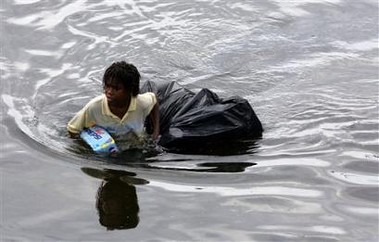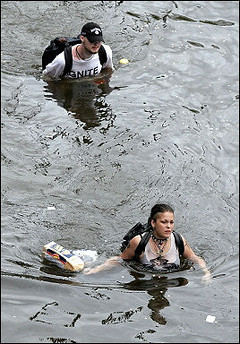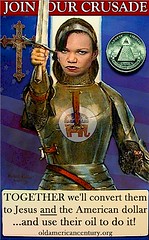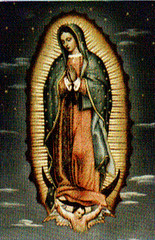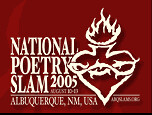At Hispanicmuslims.com there are several dozen articles about Latino/Hispanic Muslims written from different perspectives But one piece I wanted to highlight is the following about "modern-day Moors" in New York:
Olé to Allah: New York's Latino Muslims
by Hisham Aidi
November 11, 1999
On a recent crisp Friday afternoon in El Barrio, the Puerto Rican heart of East Harlem, Ramon Omar Abduraheem Ocasio, Imam of the Alianza Islamica, delivered a khutba (sermon) in Spanish, English and Arabic on fatherhood and responsibility to a motley congregation of Puerto Ricans, Dominicans, Panamanians, Spaniards, and African Americans. Although it might seem surprising to find a Muslim mosque thriving in such a traditionally Catholic community, organizations like Alianza Islamica represent the ongoing growth of Islam among Latinos in North and South America (pictured).
Founded in 1975 by a group of Puerto Rican converts, the Alianza Islamica (Islamic Alliance) was the United States' first Latino Muslim association. Before its current location at 106th Street and Lexington, the Alianza coordinated its social programs and grassroots initiatives from different bases in East Harlem. The Alianza was founded by men who came of age during the 1960s and were involved in anti-war protests, civil rights protests, and Puerto Rican nationalist movements. Amin, the caretaker of the masjid (mosque), removes his skullcap to show his scarred scalp -- "all from police batons," he chuckles.
The Alianza's social and political engagement resembles the activism of African American Muslim groups. In the Barrio, Latino Muslims have been at the forefront of battles against gang activity, drug dealing and prostitution. The Alianza has confronted gangs and drug posses, trained young men in martial arts as community law enforcers, brokered truces between rival gangs, and mentored jailed members of the Latin Kings, a local Puerto Rican gang. The Alianza's director, Hajj Yahya Figueroa, speaks about Islam and spiritual health at prisons, explains the difference between "el Islam" and "el Farrakhanismo" at rallies, gives "sensitivity talks" to police officers, and has even addressed the United Nations.
And in addition to community work, the Alianza also holds cultural programs, celebrations and weddings which are a fascinating display of the rich syncretism of "Latino Islam," featuring congregational prayers in Arabic, sermons in Spanish and English, traditional Puerto Rican pork dishes served with lamb instead, Spanish poetry slams, and conga jam sessions.
A growing number of Latinos have embraced Islam during the past two decades. In the U.S. alone, Latino mosques now exist in Los Angeles, New York, Newark, and Chicago, and the community is estimated to be 40,000-strong. The appearance of Latino Muslims is due in part to the growing Latino presence in U.S. inner cities and their subsequent exposure to African American Muslims. On an ideological level, Latino Muslims have been profoundly influenced by their African American counterparts, adopting similar ideas of spiritual self-discovery and emancipation in their approach to Islamic theology.
Like many African American Muslims, Latino Muslims celebrate a glorious past rooted in Africa -- their rhetoric often romanticizes Islamic Spain, the civilization established by the Moors, the Muslims from northern Africa who dominated Spain from the 8th to the 15th century.
Like most Latino Muslims in the U.S., Imam Ocasio acknowledges the influence of African American Muslims, but also points to important differences. "Yes," he smiles, agreeing that black American Muslims have had a significant impact on Latino converts, but unlike our African American brothers, we do not change our last name upon conversion. "Latino Muslims don't have to," he proudly explains, "because many Spanish last names -- like 'Medina' -- are actually Muslim."
Members of the Alianza Islamica share a view of Latin American and Spanish history that is increasingly aired by a younger generation of intellectuals who question the "Westernness" of Western culture. Latino Muslims like Imam Ocasio reject the idea that their culture came wholly from Europe, and instead trace their cultural ancestry to northern Africa. "Most of the people who came to Latin America and the Spanish Caribbean were from southern Spain, Andalusia," Ocasio explains. "They were Moriscos, Moors forcefully converted to Christianity. The leaders, army generals, curas [priests] were white men from northern Spain... sangre azul [blue bloods] as they were called. The southerners, who did the menial jobs, slaves, artisans, foot soldiers, were of mixed Arab and African descent. They were stripped of their religion and culture, brought to the so-called New World where they were enslaved with African slaves. But the Moriscos never lost their culture."
According to Ocasio, there are many Islamic and Moorish elements in Latin culture; he says that the Spanish "ojala" is derived from the Arabic "insha'allah" (both expressions mean God willing), while the Spanish exclamation "olé" comes from "Allah." Some scholars seem to agree. "In a sense, no single word could be said to encapsulate as such Spanish history as that three-letter word 'Olé,' " one historian wrote recently. "'Olé' is the Spanish adaptation of 'Allah', the Arabic word for God. So when Spaniards say 'Olé' at a bullfight, they are saying Praise 'Allah'." Ocasio also sees Islamic influences in Spanish and Latin American architecture. "[Just look at the] fountains, tiles, arches," he says. "You want proof that many artisans and workers were secretly Muslim? There are churches and cathedrals in Latin America which were built facing Mecca."
The debate over the Moorish influence in Spanish culture dates back to the early 20th century. While at that time many scholars refused to acknowledge Spain's Muslim and African past, or saw it as a negative influence if they admitted it at all, a few sought to celebrate that heritage. The poet Manuel Machado proudly declared himself a member of the "Moorish race, a race from the land of the sun," and the celebrated Spanish writer Federico Garcia Lorca confessed his "feeling for those who are persecuted...the Negro...the Morisco." But it was much more common for Spanish intellectuals to dispute the extent of the Moorish influences and to look on that past with hostility.
Now, younger critics are questioning and challenging the origins of Spanish literary and philosophical traditions that have previously been held to be quintessentially and inviolably "Western." Many scholars have identified African and Islamic influences in Spanish literature, music and thought, and have even traced those influences to the New World, particularly the Spanish Caribbean. The work of scholars like Lucia Lopez-Baralt, a professor of literature at the University of Puerto Rico, and the Cuban historian Maria-Rosa Menocal, would seem to support the contention of Latino Muslims like Imam Ocasio, that the Spanish Caribbean owes a tremendous cultural debt to the Moors.
Many even claim that the first non-Indian language to ever be spoken in the New World was Arabic -- Columbus set sail for the Americas, the story goes, with a crew of Moriscos and a Jewish translator, Luis de Torres, who spoke Arabic; upon landing in La Hispa?ola (now the Dominican Republic), de Torres is said to have addressed the local Indian chief in the language of the Koran: "Asalam Aleykum." With such history to refer to, for Ocasio and members of the Alianza Islamica, converting to Islam is like reclaiming a lost Muslim and African heritage.
The Alianza's banner, hanging proudly in front of the organization's two-story converted townhouse, unabashedly celebrates this revisionist view of Latino history: against a red, white and blue backdrop stands a sword-wielding Moor, flanked by a Taino Indian (one of the indigenous inhabitants of Puerto Rico) and a black African. The Spanish Conquistador -- "who raped and pillaged" -- is simply left out.
Cultural pride, alienation, and the Barrio's wretched social and economic situation, have at least partly influenced the Latino Muslims' rejection of Christianity, which many regard as the faith of a guilty and uncaring establishment.
But in rejecting Catholicism, many Latino Muslims have alienated friends and family. Khadija, who "reverted" to Islam 26 years ago, says her family was opposed to her becoming a Muslim. "My father used to pull the veil off my head," she recalls. "My mother used to cook with pork tallow. It was war." One evangelical group on 107th Street, a block from the Alianza, was also aggressively opposed to the Muslims' activities, but most Barrio residents now view the Alianza with curiosity and respect because of its community service work. As part of an AIDS outreach program, the Alianza gave lectures on HIV infection and drug abuse, helped the sick get treatment, and gave free iftar meals (festive gatherings at which Muslims break their day-long fast) during the holy month of Ramadan. "We were called the AIDS group," remembers Mohamed Mendez, the Alianza's Education Officer.
Although the local Latino community has been largely supportive of the Alianza, some non-Latino Muslims have not. Mendez says many Arab and Pakistani Muslims seem critical of the Latinos' efforts to adopt Islam. Immigrant Muslims sometimes attend djumma (Friday) prayers at the Alianza, but they often criticize the group's command of Arabic and their understanding of Islam; one Pakistani Muslim even said that Puerto Ricans are "too promiscuous" to be "good" Muslims. And in fact, the Alianza is actually being ousted from its current location by an immigrant Muslim landlord.
Despite the hostility of some Asian and Middle Eastern Muslims, the Alianza's director, Hajj Yahya Figueroa, is undaunted, and hopes to establish a dawah (proselytizing) center in the South Bronx. "In Harlem, about three people take the shahada [convert to Islam] each month," he says. We could get a bigger following in the Bronx."
Wherever the Alianza ends up, it will probably continue to grow and thrive, and will certainly continue to celebrate the Spanish Caribbean's Muslim African roots. "We are reclaiming our history after a 500 year hiatus," Imam Ocasio proclaimed at a recent Alianza event. The Catholics never successfully stripped the Moors of their identity. "We are the cultural descendents of the Moors."
